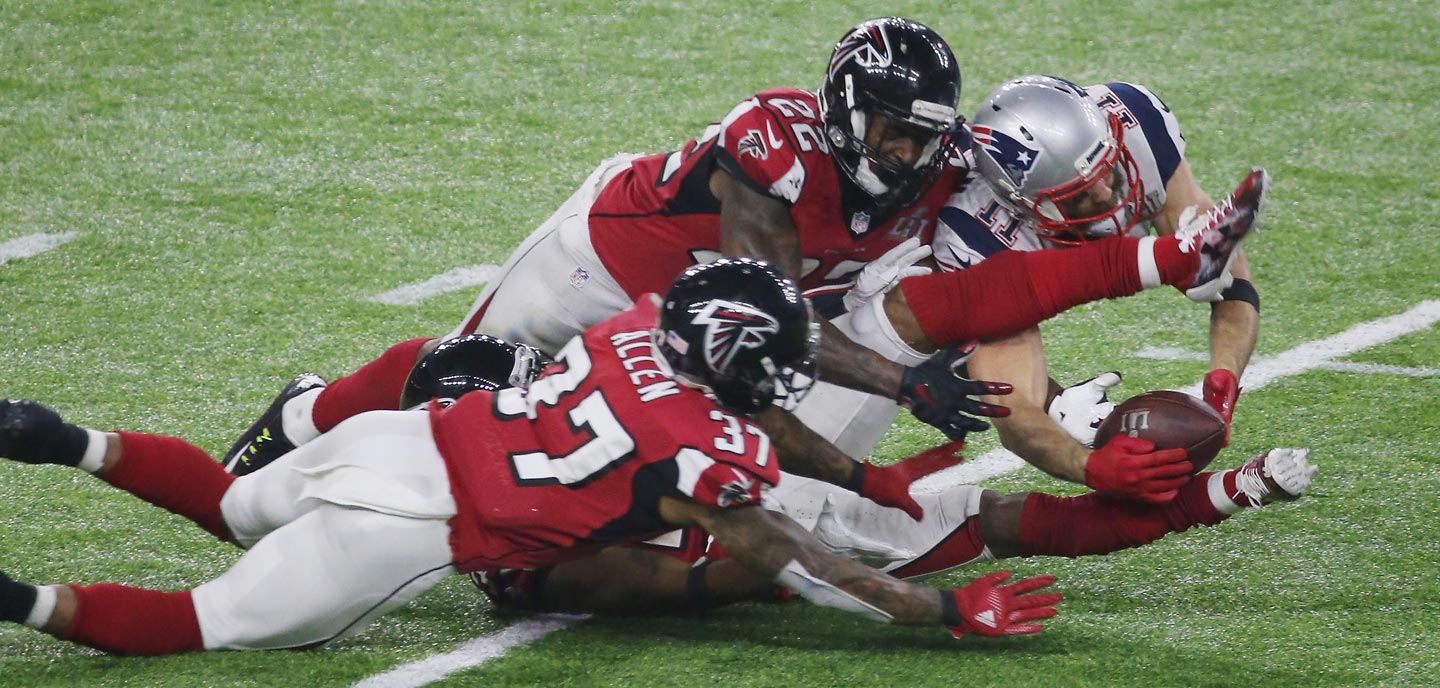I left the Super Bowl party when the score was 28-3. After a short ride home, I helped tuck my kids in bed. I checked my phone one last time, hoping to get confirmation the game was over so I could get some sleep.
28-18—wait, 28-20.
And there was still time left.
I quickly ran downstairs and finished watching arguably the greatest Super Bowl ever. How did it happen? How did the Patriots mount the greatest comeback in Super Bowl history? How did the Falcons blow that big a lead with just over a quarter to play?
Like most analysts, I have a few reasons why I think the Falcons lost that game. The fast start made them vulnerable to some common mistakes that teams easily make when they get ahead.
The mistakes they made are not limited to the game of football though. In fact, feeling like we are “ahead of the game” can make us all susceptible to dangerous habits, even on a spiritual level.
What follows is three mistakes the Falcons made that church kids across the country fall victim too as well.
Before we dive in, let me define what I mean by “church kid.”
Being involved in church is a normal part of the weekly rhythm in my definition of church kids. Involved is different than attending. Church kids genuinely enjoy being there.
That’s where their friends hang out.
That’s where their community is exists.
Church kids have a growing understanding of the storyline of the bible. Church kids pray and understand that being a Christian doesn’t make you better than anyone else—it means you are forgiven. Church kids thrive inside the culture that enabled them to mature.
But when they step outside of that, the “big lead” they have built up becomes immediately susceptible to a few bad ways of thinking—habits of the mind which lead to behavior.
Coasting Mentality
I do not know any of the Falcons personally, but I can speak from an experience of working with young men at the collegiate and NFL level. I can also speak from the perspective of being a fan.
When the team you are on or the team you cheer for gets up big, the naturally human tendency is to take the foot off the gas or to feel safe.
Get our "Top Articles" sent to your inbox weekly.
Even if it’s just a little bit.
I am not accusing the Falcons of coasting—that may even be too extreme of a word. I have to believe, however, that the urgency they played with over the first three quarters lessened. It is the natural consequence of feeling safe.
Yes, safe and comfortable are not bad. But it does not mean that they come without a cost.
Church kids falls prey to this same mentality. Their “head start” makes them prone to phases of laziness. The spiritual disciplines that helped them grow are now merely suggestions since they have already arrived at “spiritual maturity.” Entitlement creeps in.
“I have woken up early every Sunday to go to church, I deserve to sleep in a few times.”
“I have been obedient in so many areas of my life, I deserve a little freedom.”
“I already know all of the stories in the bible, I don't need to keep digging into the word.”
The snowball effect of entitlement is tough to slow down. It all starts, however, with letting our foot of the gas in our pursuit of becoming more like Christ.
When we begin to coast, a natural next step involves minimizing the threats around us.
Minimizing Sin
When the Patriots scored to make it 28-9 (missed the extra point), I am guessing Falcons players—and fans—thoughts to themselves, “No big deal, we still have a huge lead.”
Then the score became 28-12. “All good. Still have a big lead.”
Then 28-18. “We’re still in control, they need a 2 point conversion to actually—yikes, they just got it.”
You get the picture.
Because the Falcons amassed such a big lead, the early stages of the Patriots comeback were not viewed as a threat. Sure they scored a few times, but they still had a long way to go. A very long way to go.
Church kids face the same struggle. We grew up with rhythms in our life that put us in community with other Christians. We went to youth group events. We prayed. We sang. We memorized scripture (shout out to AWANA!).
In short, we were ahead of the curve when we entered into the real world and the temptation to minimize sin or unwise behaviors becomes a reality.
“I’ve been good my whole life, it’s ok for me to dabble in this for a bit.”
“It’s not like I have been doing this my entire life, it’s just a phase that will go away.”
Our “big lead” in life leads us to to minimize any potential threat to our walk with God.
We wrongly believe that we have amassed enough “credits” with the Father where we can intentionally act out on an occasional sin and not have it affect us. As long as we are still ahead—however we define that to make us feel good about ourselves—we do not get overly stressed about the occasional setback.
Minimizing the Enemy
I do not have any doubts the Falcons thought Tom Brady was great. At this point you would have to be a fool to question whether or not he stands as one of the greatest quarterbacks to ever play the game. With the game seemingly out of hand at 28-3, the Falcons still probably respected him a great deal.
But I am guessing they did not feel threatened by him.
They spent three quarters pounding him into the ground on defense as their offense continued the explosive pace set all throughout the regular season. Brady was quiet for three quarters. But it only took him one quarter (and an overtime period) to win the Super Bowl.
Most church kids spend the first stage of their walk with Christ with incredible momentum and trajectory. Sure, they know something of the devil and what he’s about in the world.
They can probably tell you a lot about how he fell from heaven and what he is currently trying to do to thwart God’s plans. There is a tendency to believe the devil exists, but an assumption based on their “successful” past that he cannot harm them.
Most church kids have such a positive youth group experience and live in such a Christian bubble that they are ignorant to the enemy they will face once that bubble inevitably pops. When hardship or temptations come, a propensity to blame God appears instead of facing the reality that they are battling against a very real enemy.
(Let’s be mature about this before I move on: I am not comparing Tom Brady to the devil. Don’t be the person who wastes time with that in Facebook comments!)
How to stop the momentum
I was a church kid.
I experienced—and still do—the negative side of having great trajectory in my faith as a youth. I know how easy it is to minimize sin and think “well, at least I haven’t screwed up as much as the person over there!”
The feeling of contentment in my faith led me to coast in my college years, to minimize sin, and ultimately to underestimate how good the enemy is at his job. How did the downward momentum finally stop? The same way the positive momentum started in the first place.
By applying the gospel.
The gospel—the good news that Jesus died the death we deserved to die, in our place, so we could have a restored relationship with the Father—purposes not only to save us, but also to sustain us as we live our daily lives.
I have heard pastors explain that it is not merely the diving board, but the pool itself.
We never graduate from relying on the gospel’s power to save us. The reason is that the gospel’s agenda is one of grace.
The gospel helps us see that coasting results from the flawed thinking that we did something in the first place to get ahead. The gospel is a free gift, not an earned nor deserved gift.
We use the gospel to battle the tendency to coast by understanding it is not just a one time decision to determine eternal destination. The acceptance of the gospel is a lifetime commitment to a pursuing Christ with all we have.
The gospel helps us see that minimizing sin is minimizing what Jesus had to do to pay for it in the first place. When we truly understand the good news, we understand just how ugly our sin is—no matter how big or small we perceive it—against the backdrop of a holy God. The gospel of grace allows us to lean into God for the continual forgiveness we desperately need.
Finally, the gospel helps us see that death has lost it’s power, but the enemy is still roaming about, seeking to destroy those who walk with Jesus. The gospel, which Romans 1:16 says is the “power of God,” is how we defeat the enemy.
A growing understanding of the good news brings a heightened awareness that there is indeed a battle being fought by competing sides, and that can make all the difference when it comes to the outcome of our lives.














